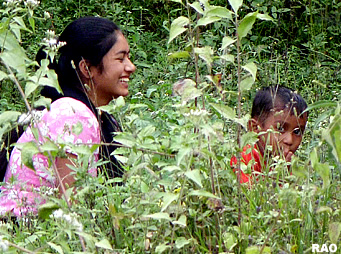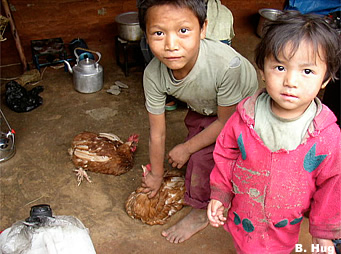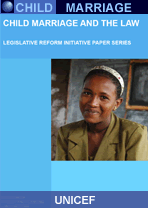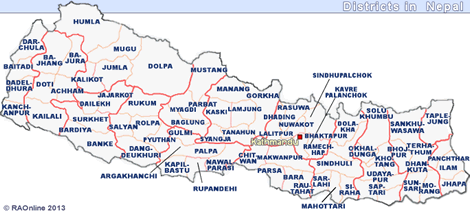| Social
Life - Social
Status of Women |
 |
 |
Nepal:
Social Life - Child Marriage |
|
|
 |
|
Dom
girls marry early to escape poverty |
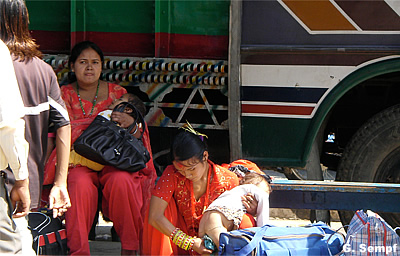 |
| Deva
Malikar does not know anything about children's right, nor has he heard
anything about women's rights. Like everyone in his Dom community here,
he too has married off his daughter Manju and niece Anita even before the
girls have reached puberty. Manju is six years old and Anita has just turned
four. When asked why he has married the girls so young, Malikar says that
this is the custom of the Doms. "I too was first married when I was just
three years old," he says. |
|
His
wife Devi Malikar gives a more practical answer. " Once the girls are big
they only get ëDutibars' (second timers)" she says. Giving her own
example she says, "My dad did not marry me off till I was 12 years old
and that is why I got married to this old man." She smiles and points at
her husband.
Deva
is 42 years old and Devi has just turned 30. The reason for the huge age
difference between the two is the fact that Deva married Devi after his
first wife, Harimariwali died after giving birth to a son. Deva has altogether
eight children, four sons and three daughters from Devi and a son from
previous marriage. "It's not only I that have married my daughters in early
years, all the Doms get their children married before they are ten years
old," Deva says.
He
gives his reason for getting the children married off at an early age.
"Life is not certain, anything can happen to us anytime," says he. "Who
will marry the children if something happens to the parents ?" he questions.
The
girls too seem to have adapted to their early-married life or at least
begun to feel for their husbands. Anita was married just two months ago
to five years old Binod who is squinted, the son of Majirba Malikar from
Loharpatti. She is hurt when anyone calls Binod a kahna (squinted). " Shall
I call your husband a thatengra (lame) ?" she questions when her cousin
Manju calls Binod a kahna.
The
Doms are totally unaware of the laws against child marriage. When tried
to inform them about the existing laws the Malikar couple get angry. "Which
office? Which Police will punish us?" they question. "The law does not
care when we sleep hungry. No police or any official comes and asks us
if our children are hungry and why do we have to ask them to get our children
married?" they say.
The
Malikar couple who earn by making mattress, boxes, and other traditional
household items out of bamboo say that they spent around Rs 12,000 for
the weddings. They explain proudly how they feasted 15 guests from the
groom side for three consecutive days of the weddings..
| Child
marriages |
 |
This
is the story of Dom community living in the tarai belt of the country.
The
advocacy campaigns against child marriage primarily by the NGOs might have
brought some changes in perceptions about it, in other areas. But not in
the Dom community. This community is neither touched by the advocacy
programmes nor is anybody in the community thinking about changing it.
Child marriage, for them is a deep rooted tradition and they only want
to uphold their tradition.
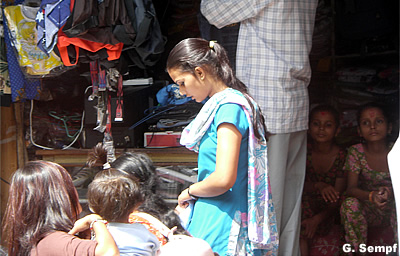 |
| What
is the right age for anybody to get married? The answer would differ from
place to place throughout the country. The most acceptable answer would
be: girls should be at least over 16 and boys above 18. You would be utterly
dismayed by the answer the Dom people will give for the question. For them
any child who is no more breasted is eligible for marriage. The parents
are just petrified to let their child get any older than eight years. "They
do not get a suitable mate once they are over eight years of age," says
a local Dom. |
|
The
marriage code on Muluki Ain (civil code) states that anybody who gets a
girl below the age of ten years married shall be penalised a cash amount
from Rs 5,00 to Rs 5,000. They will also be put into jail for three months
to three years. These legal provisions do not touch the Doms, not that
they are aware of. "We do not know the law," says Krishna Malli. "This
is our tradition." Sobhit has yet another reason to give on why they go
for early marriage. "Who will look after my daughter if I die before she
becomes 16 and gets married," says he. "Now if I get her married somebody
will be there to look after her even if I die tomorrow," says Sobhit pointing
at his four year old daughter.
Once
the girl gets married, she does not return to her husband's house until
he comes to take her. During the gap of years till she finally comes to
stay with her husbands family she does not even visit her husband's house
even once. And it is the other members of family who remain in touch with
eachother. It is not that all these marriages arranged by the parents have
a happy ending. Some get broken too. Should a condition to break any marriage
arise, the village Panchayat gets to decide on the compensation that has
to be paid by the party asking to end the marriage.
Narayan
Malli, a resident of Malangawa municipality-3 says that his wife did not
agree to come withhim when they were old enough. "But I got Rs 10,000 compensation
from my in-laws," says Narayan. Despite this deeprooted tradition, there
are some who would like to change it for the better and end up being ridiculed
by the community. "I want to educate my daughter and get her married
off at the appropriate age," says Bali Malli, a retired employee of the
municipality pointing at his daughter, five year old Mamata. "I can perceive
sarcasm in everything that the villagers talk about," says Bali. The district
court says that there is nothing it can possibly do to stop this tradition.
"We can initiate actions if any cases on child marriage are filed in the
court and proved," says an officer at the court. But till now no cases
of child marriage are registered in the court and taking actions against
those practising it is still far off.
top
|
Publication |
 |
| More
Information |
 |
|




